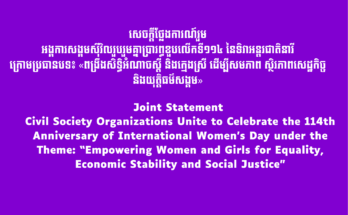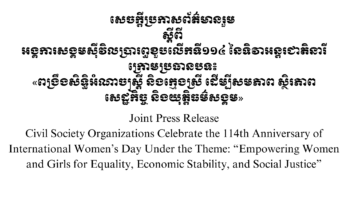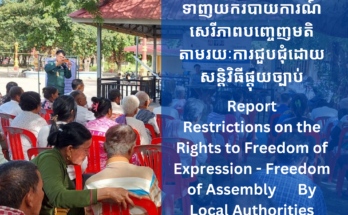Conference ASEAN Civil Society Conference/ASEAN Peoples’ Forum (APF)
13 January 2012
Today in Phnom Penh, the Cambodian Human Rights Action Committee (CHRAC) hosted the National Consultation Workshop on Understanding of ASEAN and ASEAN Civil Society with a view to preparing Cambodian civil society members for the upcoming ASEAN Summit 2012, to be hosted in Cambodia. ADHOC, currently chairing CHRAC, played a large role in coordinating this event. The consultation served to further educate Cambodian Civil Society on ASEAN, and to select members of seven committees that will be responsible for organising and facilitating the ACSC/APF 2012, which will take place alongside the ASEAN Leader Summit.
Today’s consultation was attended by over 300 participants, including members of Cambodian and International non-governmental organisations, Embassy representatives and some Government staff. The President of ADHOC, Mr. Thun Saray, delivered the opening remarks in which he questioned the role of ASEAN and of Civil Society in ASEAN activities. He stressed the need for regional civil society to be actively involved in ASEAN affairs. He raised the point that as Cambodia is the host of the ASEAN Summit, Cambodian Civil Society must work together to organise the ACSC/APF 2012.
He also highlighted that the members of seven committees needed to be selected during this national consultation. These committees are as follows: the steering committee; program committee; drafting committee; organising committee; interface committee; media committee; special and emergency committee. Thun Saray noted that these committees would have to be dedicated to achieving meaningful civil society input in the decisions taken at this year’s ASEAN summit.
The facilitator of the National Consultation, Mr. Chhith Sam Ath, introduced four guest speakers. The first was Ms. Thida Khus, Secretary General of CPWP, who gave an overview of ASEAN, its objectives and its significance to the nations of South-East Asia. She outlined a brief history of ASEAN, its founding in 1967 with five member countries, and its growth- now consisting of 10 members (Cambodia joined in 1999). The objective of ASEAN is economic, cultural, social development among the 10 countries, while maintaining peace and stability in the region. The countries support each other, in areas of agriculture and industry for example, while respecting each other’s independence and sovereignty. By 2015, ASEAN leaders intend on achieving one economic community for all member states.
The second speaker was Ms. Yuyun Wahyuningrum, from the Human Rights Working Group. She spoke on her experience in organising the ACSC/APF in Indonesia. She spoke of the interface meetings between ASEAN leaders and NGO leaders and lessons learned from this. She also highlighted that ten years ago, civil society was extremely sceptical about involvement with ASEAN but now more and more civil society members believe in the importance of dialogue with the leaders and of actively participating as much as possible. The features of the process of the ASEAN Summit and Civil Society conference was briefly outlined: statement from civil society, the national consultation process, the regional consultation process, interface meeting with leaders, civil society leadership process, and the country day session.
Mr. Pen Somony, Executive Director of CVS spoke third and gave his experiences participating in ACSC/APF as a Cambodian Civil Society representative. He spoke about the concept of the ACSC/APF, outlining that it is an annual gathering for civil society giving members an opportunity to raise and discuss concerns and to create a joint statement to submit to ASEAN leaders. He gave a brief history of the ACSC/APF, adding that the national preparation process is essential, especially leading up to 2015. The following problems were highlighted: The fact that the ACSC is not recognised in some ASEAN countries; interference from GONGOS (Government-Organised Non-Governmental Organisation); difficulties in securing interface meetings between CSO members and ASEAN leaders; general issues of creating dialogue with ASEAN leaders; and undeveloped mechanisms of follow up on the implementation of the statements/decisions at ACSC/APF. He gave recommendations for ASEAN governments- that they should recognise and support NGOs and not endorse interference from GONGOs. To CSOs he recommended that they should be more organised and prepared to raise issues and recommendations to ASEAN leaders, and that they should be clear and concise in their requests.
The final speaker, Mr. Sok Sam Oeun, the Executive Director of CDP, addressed the lessons Cambodia has learned so far from ASEAN membership and the opportunities and challenges arising. He expressed hope that all member countries can work together towards peaceful and stable development while briefly warning that Cambodia should not lose Khmer culture and become a homogenous with other South East Asian states.
The general attitude towards Cambodia’s ASEAN membership and role as host of the ACSC/APF 2012, as well as the leader’s summit, was positive and hopeful. In the afternoon, civil society representatives voted for members of each organising committee amongst their colleagues. Judging by the 308-strong audience, Cambodia’s civil society are embracing their role in the organisation of the upcoming events and are determined to ensure that the ACSC/APF 2012 is a meaningful and fruitful experience for everyone involved.



